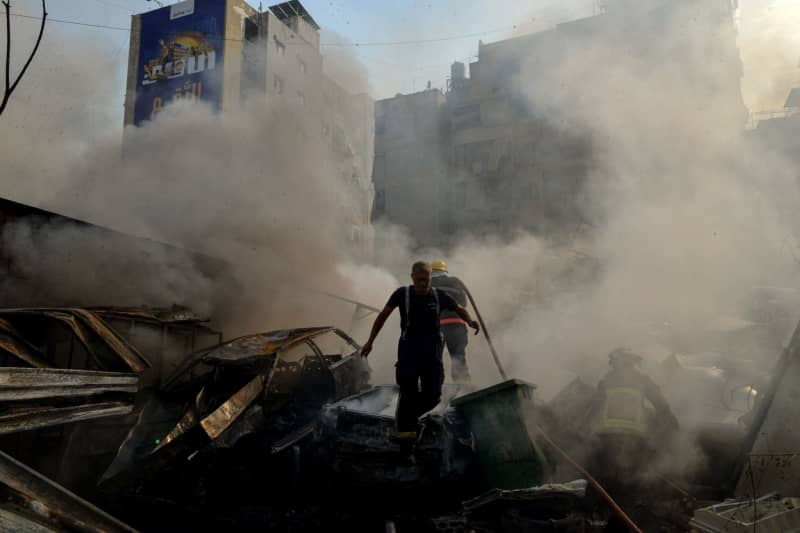Israeli airstrikes killed 52 people on Friday in eastern Lebanon, the Lebanese Ministry of Health said, while aerial attacks on Beirut were described as “apocalyptic” by local residents.
In eastern Lebanon, 72 others were injured in the strikes that targeted 14 different areas in the province of Baalbek-Hermel, the ministry added.
The highest toll was in the province’s town of Amhaz where 12 people were killed, according to the ministry’s statement.
‘ApocalypseNow’: Beirut residents reel from impact
Earlier, the Israeli military carried out strikes on targets in southern Beirut for the first time in nearly a week on Friday, with residents describing the fallout as “apocalyptic.”
At least 11 airstrikes hit the district of Dahiyeh from about 2 am (0000 GMT), according to Lebanese security sources and eyewitnesses. Police in Beirut said they registered at least 20 strikes.
A dpa reporter saw plumes of black smoke rising over the area. Explosions could be heard across large areas of the Lebanese capital.
Israel’s military said the air force’s attacks had targeted weapons manufacturing facilities and Hezbollah command centres in the Beirut area, accusing the Lebanese militia of deliberately storing weapons used for attacks on Israel in civilian areas.
An Israeli drone also hit an apartment in Qumatiya, in the Aley district, some 20 kilometres south-east of the capital, killing at least two people including a member of the Hezbollah militia, security sources said. The Lebanese Health Ministry said later that three people were killed and five wounded in the drone strike.
A few hours earlier, the Israeli military had announced it would attack Hezbollah facilities in southern Beirut, a stronghold of the Iranian-backed militia. The armed forces published two maps with the targets and called on residents to keep at least 500 metres away from the buildings.
‘Reminds me of “Apocalypse Now”‘
Locals talking to dpa following the strikes likened the destruction to scenes in a well-known war film.
“Look it reminds me of ‘Apocalypse Now,'” said one man who was standing on the rubble of his neighbours’ house on the old road to Beirut’s airport.
“If the Israelis hadn’t given us one hour, you would have seen a massacre here today,” he said.
The man, who identified himself as Ali, said “the scenes are the same as Gaza, the same tactics, destruction and displacements.”
Israeli attacks on southern Lebanon continue
The Israeli Air Force on Friday also reported strikes on more than 200 targets in both the Gaza Strip and southern Lebanon over the previous 24 hours, targeting command centres and rocket launchers operated by Hamas and Hezbollah.
Palestinian and Lebanese reports spoke of civilian deaths.
A dpa photographer could only reach bombed areas on a motorbike as rubble was covering the roads. People were seen wearing masks due to the smoke coming from destroyed houses. Black fog was covering the capital following the strikes.
Israel has massively expanded its airstrikes in Lebanon since September and has targeted Hezbollah’s leadership several times.
In addition, Israeli troops marched into southern Lebanon last month.
Hezbollah has continued to strike northern Israel almost daily for over a year, including with rockets.
Israel is fighting on several fronts, from Palestinian militant group Hamas in Gaza to the Iran-backed Hezbollah militia in Lebanon.
Iranian adviser to supreme leader says Tehran to respond
There have also been direct exchanges between Israel and Iran, prompting fears among the international community that the Middle East could slip into all-out war.
Iran will respond to the latest Israeli attacks, said a close adviser to Supreme Leader Ayatollah Ali Khamenei.
“The Israeli attacks will not go unanswered,” Kamal Kharrazi, Khamenei’s foreign policy adviser, told Arabic news channel Al Mayadeen, according to Iran’s IRNA state news agency.
Kharrazi’s comments referred to Israeli attacks on Iran’s military installations and anti-aircraft defence system, which caused little damage, according to Tehran.
Israel’s strikes on Iranian targets are seen as retaliation for Iran’s October 1 attack on Israel, in which it launched nearly 200 ballistic missiles against the Jewish state.




Leave a Comment